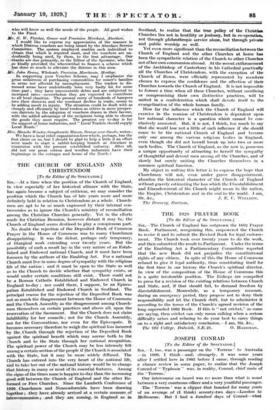THE CHURCH OF ENGLAND AND CHRISTENDOM [To the Editor of
the SPECTATOR.] Sgt,—At a time when the position of the Church of England, in view especially of her historical alliance with the State, has again become a subject of criticism, we may consider the position which the Church has of late years more and more definitely held in relation to Christendom as a whole. Church- men are apt to be so much engrossed by their internal con- troversies as to ignore the Church's ministry of reconciliation among the Christian Churches generally. Yet in the efforts niade•for Christian Reunion, however distant it may be, the Church of England seems destined to play a conspicuous part.
No doubt- the rejection of the Deposited Book of Common Prayer in the House of Commons was to many Churchmen disappointing. It was the defeat, perhaps only temporary, of liturgical work extending over twenty years.- But the possibility of such a- result lay in the very nature of an Estab- lished and Endowed national Church, and it must have been foreseen by the authors of the Enabling Act. For a national Om& must live in some degree of sympathy with the religious life of the nation ; and it must be open to the State as well as to the Church to decide whether that sympathy exists, or would under certain conditions still exist. • There could not be a Roman Catholic Established and Endowed Church in England to-day ; nor could there, I suppose, be an Episco- palian Established and Endowed Church in Scotland. The principal reason for the rejection of the Deposited Book was not SO -much the disagreement between the House of Commons and the Church Assembly as the disagreement among Church- men themselves on certain practices and above all, upon the reservation of the Sacrament. But the Church does not claim infallibility for her councils ; not for the Church Assembly, nor for the Convocations, nor even for the Episcopate. It becomes necessary therefore to weigh the spiritual loss incurred by the. Church through the rejection of the Deposited BOok against the spiritual benefit which may accrue both to the. Church and to the State through her national recognition. The spiritual power of the Church may be less intensely felt • among a certain section of the people if the Church is associated with the. State, but it may be more widely diffused. The Church- has-entered into the very heart of,the. national life, and to take her out of the national history would be to change that history in many on most of its essential features. Among the signs of the times none is happier to-day than the increasing good will between-the Church of England and the other Re- formed or Free Churches. Since the Lambeth Conference of 1929 Churchmen and Nonconformists have • been drawing together ; they have already arrived at a certain measure of intereommunion.; and they are coming, in England as in
Scotland, to realize that the true policy of the Christian Churches lies not in hostility or jealousy, but in co-operatiOi, not through` philattbropic service alone, but through private and public worship as well.
Yet even more significant than the reconciliation between the Church of England and the other Churches at home has been the sympathetic relation of the Church to other Churches not of her own communion abroad. At the recent enthronement of the Archbishop of Canterbury in his Cathedral practically all the Churches of Christendom, with the exception of the Church of Rome, were officially represented by members chosen to express the confidence and the affection of their Churches towards the Church of England. It is not impossible to foresee a time when all these Churches, without sacrificing or compromising their own distinctive practices, will be united in -a confederation which shall devote itself to the evangelization of the whole human family.
How far the influence which the Church of England will exercise in the reunion • of Christendom is dependent upon her national character is a question which cannot be con- clusively answered. But, it is not, I think, too much to say that she would lose not a little of such influence if she should cease to be the -national Church of England and become only one among the various religious bodies in England, even though she did not herself break up into two or more such bodies. The Church of England, as she now is, possesses a• unique opportunity of attracting to herself the sympathy of thoughtful and devout men among all the Churches, and of slowly but surely uniting the Churches themselves in a common spiritual function.
My object in writing this letter is to express the hope that Churchmen will not, even under grave disappointment, ahandon the historical character of the Church of England without gravely estimating.the loss which the Disestablishment and .Disendowment. of the Church might mean to the nation, the Empire, Christendom and in the end_to the world. I am,






































 Previous page
Previous page